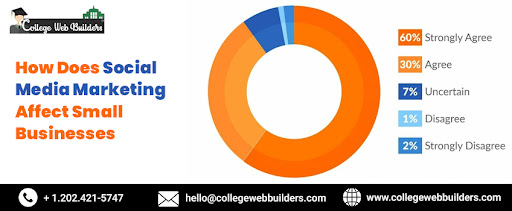
How Does Social Media Marketing Affect Small Businesses
SMO Services are the need of the hour as more than half of the world's population now uses a variety of social platforms. As its tentacles extend into every aspect of modern life, it's no surprise that small businesses are tapping into their vast potential. As a digital marketplace with nearly 3 billion potential customers, social media is a place to find potential customers and promote your brand and services. Hire an SMO company who can guide you with the trends and strategies. Even with a small marketing budget, you can reach large audiences with your content with just a Facebook, LinkedIn or Twitter account. Businesses recognizing these benefits can use social media to generate leads and build brand identities to reach and resonate with a wider audience. But let's take a closer look at what our Social Media Optimization Services in the USA can provide for small businesses and exactly how it can bring certain benefits to your brand.
1) Social Media and Marketing
Currently, around 3.6 billion people worldwide use social networks. 40% of these users use social media to find information about new brands. This provides tremendous branding and marketing opportunities for small businesses and your SMO Services agency. Your brand is important to customers' perceptions of your business and is often the first line of defense against what customers can expect of you in the future. By implementing a well-thought-out social media strategy, you can expect some promising marketing benefits, including:
- Increase brand awareness.
- Connect directly with millions of users.
- It's a free way to publish original content that drives customers to your site.
You can also connect to social media to research competitors and support competitor analysis. By following competitive brands and specific hashtags, you can see what competitors are creating and sharing, and what others are saying about the brand. Our social media optimization agency in Ashburn VA can help you with this.
2) Social Media and Sales
Social media can play a very important role in increasing sales for small businesses. As mentioned in the points to Brand Awareness, social networks allow you to serve the public. Our SMO Services Agency in Ashburn USA shows how important brand awareness is and that's why they use strategies. Some sales strategies work better when you focus on qualified leads, but they are great because using social media can help you build a broader network.
3) Social Media and Your Website
Social media is a great solution when you are looking for a cost-effective way to drive more traffic to your website. The more relevant content you share, the more opportunities you have to connect with your followers. A solid content distribution strategy includes an effective social media sharing plan. Because that's the best way to get millions of people to not only see your content, but also click on it to visit your site. The result is more visitors and more leads, converting those visitors to email subscribers and valuable leads with SMO Services Company.
4) Social Media and Customer Service
Social networks with a good SMO Services Company Ashburn USA offer entirely new opportunities to attract and interact with customers. Obviously, the best way to provide customer service is to do it yourself. However, it is still a viable option as many people rely on social media as a way of connecting. Social media is a great way for small businesses to quickly and easily respond to customer inquiries and provide the latest updates.
Choosing The Right Social Media Strategy For Your Business
Choosing the right social media strategy for your business is crucial to effectively reach and engage your target audience. Here are some pointers to consider when selecting a social media strategy:
1) Define Your Goals: Clearly identify your objectives for using social media. Whether it's increasing brand awareness, driving website traffic, generating leads, or enhancing customer engagement, aligning your strategy with specific goals will help you make informed decisions.
2) Know Your Target Audience: Understand your target audience's demographics, interests, and online behavior. This knowledge will help you determine which social media platforms are most relevant to reach and engage your audience effectively.
3) Research Social Media Platforms: Evaluate different social media platforms based on their user demographics, features, and functionalities. Consider platforms such as Facebook, Instagram, Twitter, LinkedIn, YouTube, and others that align with your target audience and business objectives.
4) Content Strategy: Develop a content strategy that aligns with your brand voice and resonates with your target audience. Determine the type of content you will create, such as informative articles, visual content, videos, or user-generated content. Plan the frequency and consistency of your posts to maintain audience engagement.
5) Engagement and Interaction: Social media is a two-way communication channel. Encourage engagement by responding to comments, messages, and mentions promptly. Foster conversations, ask questions, and encourage user-generated content to build a sense of community around your brand.
6) Paid Advertising: Consider utilizing paid advertising options offered by social media platforms to expand your reach and target specific audience segments. Platforms like Facebook and Instagram offer advanced targeting options that can help you reach a highly relevant audience.
7) Performance Tracking: Implement tracking tools and analytics to monitor the performance of your social media efforts. Analyze key metrics such as engagement, reach, click-through rates, conversions, and return on investment (ROI) to measure the effectiveness of your strategy and make data-driven optimizations.
8) Stay Updated: Social media platforms and trends evolve rapidly. Stay informed about new features, algorithm changes, and emerging platforms to adapt your strategy accordingly and stay ahead of the competition.
9) Test and Adapt: Experiment with different approaches, content formats, and strategies to identify what works best for your business. Continuously analyze the results, gather insights, and adapt your social media strategy to optimize engagement and drive results.
By following these pointers and tailoring your social media strategy to your specific business needs, you can effectively connect with your target audience, build brand awareness, drive engagement, and ultimately achieve your business objectives.
Scope of Social Media Marketing
The scope of social media marketing is extensive and continues to expand as more businesses recognize the power of social media platforms in reaching their target audiences. Here are key points highlighting the scope of social media marketing:
1) Broad Reach: Social media platforms have billions of active users worldwide, providing businesses with the opportunity to reach a vast audience across different demographics and locations.
2) Targeted Advertising: Social media platforms offer sophisticated targeting options, allowing businesses to reach specific segments of their audience based on demographics, interests, behaviors, and more. This targeted approach increases the effectiveness of marketing campaigns.
3) Brand Awareness and Engagement: Social media enables businesses to build and enhance brand awareness by creating compelling content and engaging with their audience. By consistently sharing valuable and relevant content, businesses can increase brand visibility and foster meaningful connections with customers.
4) Customer Relationship Management: Social media platforms provide a direct line of communication between businesses and their customers. It allows for real-time interaction, responding to customer inquiries, addressing concerns, and building relationships.
5) Influencer Marketing: Social media has given rise to influencer marketing, where businesses collaborate with influential individuals to promote their products or services. This strategy leverages the influencer's large and engaged following to increase brand exposure and credibility.
Conclusion
Social media is not only a strategy that every small business should implement, but it can also do wonders for different facets of your company. Hire an SMO company who can focus on the social platforms your customers interact with the most, and plan to keep posting and engaging with your customers. Track KPIs to determine what works for you and tune in for lasting success. For more information, visit Collegewebbuilders.com.
- Tags: Marketing, Onlline, Internet





